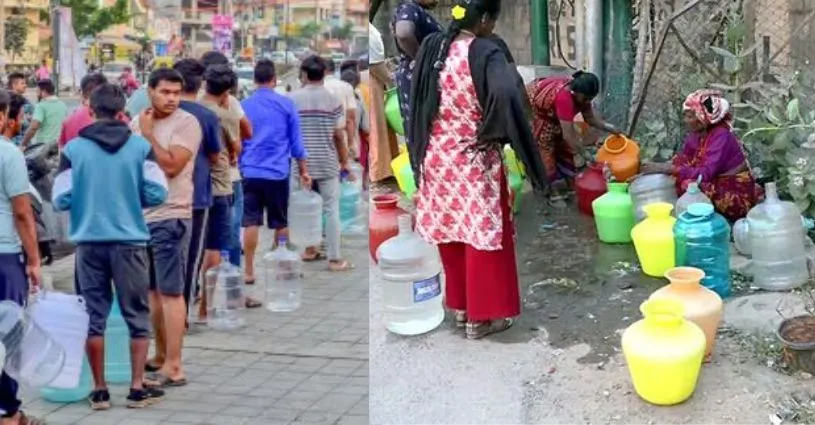India’s IT hub, Bengaluru has recently fallen victim to its most severe water crisis yet, with nearly half of the high-tech city’s borewells running completely dry. The situation has been so dire that the Karnataka CM Siddamariah and Deputy CM DK Shivakumar, had to convene a crucial meeting to address this catastrophic water shortage. Not only this, but even the housing authorities resorted to water rationing and have started imposing severe penalties for wasteful water usage, with some localities blanket banning activities like vehicle washing & swimming pool activities. Even the Deputy CM claimed that the borewell in his own house has run completely dry.
The locals are also severely affected by the water crisis. According to reports, the residents are standing in long queues to acquire water as several borewells in many areas of the city have dried up. The residents are dependent on water tankers for their daily chores which are now charging extortionate amounts while exploiting the water scarcity. But what has led to this apocalyptic shortage of water in what is known as India’s “Silicon Valley”? Here’s what we know:
A severe water shortage had been looming over the city since early January as the city was experiencing a severe drought. A lack of rainfall has led to a decline in the Cauvery River water level and the groundwater levels. The city receives 1,450 million litres per day (MLD) of water from the Cauvery and will get 775 MLD more once the Cauvery V Stage is commissioned in April. Not only this, the lack of rain has also led to depleting levels of groundwater. The city also depends on groundwater resources for up to 700 MLD every day.
Another factor contributing to the crippling water shortage is the private water tanker suppliers exploiting the water crisis and charging exorbitant amounts for water supply. It used to cost between ₹600 and ₹800 for a 1000-litre water tanker, but now it costs more than ₹2000. The Bangalore Water Supply and Sewerage Board (BWSSB), responsible for the city's water supply, mainly relies on the Cauvery River for water. The areas without access to Cauvery water connections depend on borewells or tanker water.
Another important point exacerbating the crisis is the rapid urbanisation of Bengaluru, once known as the "garden city" and "pensioner's paradise" for its pleasant climate. This rapid urban development has come at a huge cost to the environment. Over the past four decades, the city has lost 79% of water bodies and 88% of ‘green cover’, while areas covered by concrete have increased by nearly 11 times, according to studies at the Indian Institute of Science (IISc).
How is the Government tackling the crisis?
Karnataka Chief Minister Siddaramiah and Deputy CM D.K. Shivakumar had convened a crucial meeting to address the worsening water shortage in the city. During the meeting it was revealed that out of 16,781 borewells in Bengaluru, 6,997 have dried up. Following the meeting it was announced that the state government plans to use milk tankers from Karnataka Milk Federation (KMF) to deliver water to Bengaluru. They will also take control of private borewells in and around the city. Deputy Chief Minister DK Shivakumar discussed this during a meeting with various agencies including BBMP, BWSSB, and the police. It was also decided that owners of water tankers have until Thursday to register them with the government. Failure to register will lead the government to take over all the unregistered tankers in the city.
The housing authorities of the city have also taken matters into their own hands, as according to reports, a housing society in Bengaluru's Whitefield district has implemented a ₹5,000 fine for residents found misusing drinking water. The Apartment Owners Association (AOA) of "The Palm Meadows" decided to enforce a 20% reduction in water consumption for each unit. Failure to meet this limit will result in an additional fine Rs. 5000, with the reduction expected to reach 40% during peak summer months.
What is the Cauvery Phase V project?
In the 2024-2025 budget speech, CM Siddaramaiah announced that the BWSSB would start Phase-5 of the Cauvery project, aiming to provide 110 liters of drinking water daily to 12 lakh people at a cost of Rs 5,550 crore. This project is expected to be completed by May 2024. The water shortage issue in the 110 villages added to BBMP in 2008 will be solved once the Cauvery V Stage work is done, according to reports. The Phase-5 project will also include underground drainage works, which are scheduled to be finished by December 2024. This involves laying 228 km of drainage pipeline and building 13 sewage treatment plants capable of treating 100 MLD of sewage water.
